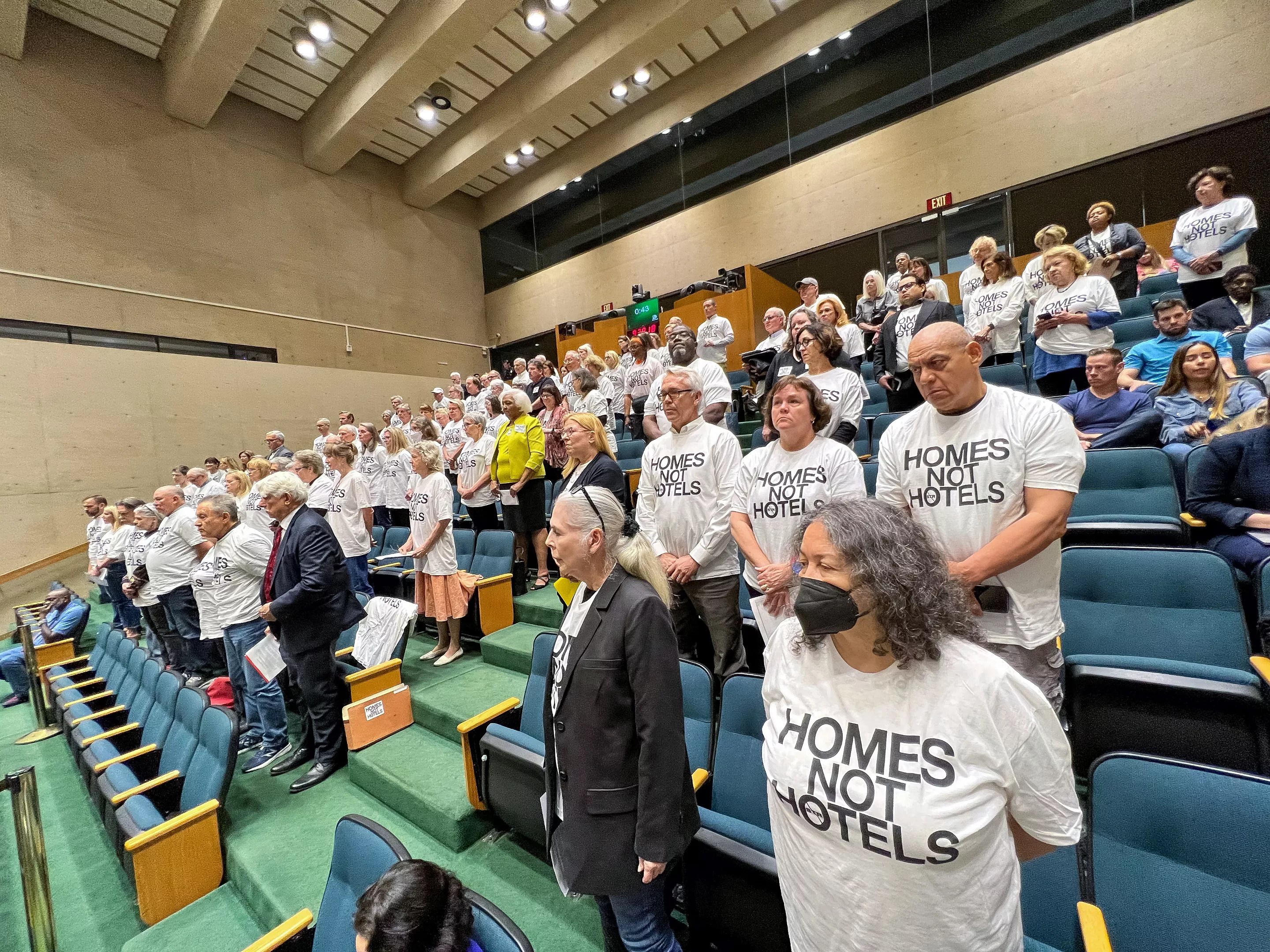
Photo illustration by Sarah Schumacher

Audio By Carbonatix
There was once a time when it felt like all of City Hall’s energy was being leveled at short-term rentals. Eradicating the listing of single-family neighborhood homes or mother-in-law suites on websites like Airbnb or VRBO took up hours of council agenda time and community meetings before passing overwhelmingly in June 2023.
That ordinance, which would have eliminated nearly 95% of Dallas’ short-term rentals, was set to go into effect in December 2023.
Instead, it has spent the last two years tied up in litigation. The two most recent rulings in the case suggest that, despite Dallas’ determination to get rid of most STRs, there may not be a legitimate legal argument to actually implement the policy.
The latest development in the case comes from Texas’ 5th District Court of Appeals, which ruled late last month that an injunction on the ban previously issued by a lower court should remain standing while a broader legal challenge is being considered. The ruling was made after the City of Dallas appealed an order upholding the injunction earlier this year.
The court sided with vacation rental operators who claimed the ordinance passed by the city of Dallas violated their constitutional rights as property owners. The court opinion states that the evidence presented in the case “tended to show” that an enforcement of the ban would deny those rights.
In a statement provided to the Observer, the Dallas Short-term Rental Alliance said the coalition is “pleased” with the court’s opinion and wants to return to the table with city leaders to craft a “fair and sensible” regulatory ordinance.
“We would welcome moving past the lawsuit and getting to the serious business of putting a reasonable ordinance in place that represents the interests of our membership as well as the neighborhoods in which we live,” the statement said. “Meanwhile, we are busy preparing for the 2026 FIFA World Cup and are concentrating on rolling out the red carpet for our international guests and showcasing Dallas to the world.”
World Cup tickets go on sale Sept. 10, and it’s safe to assume that Dallas’ rental options will be quickly swallowed up as international visitors make plans to travel to North Texas for the games. In a statement to CandysDirt.com, a City of Dallas spokesperson said the city “is considering its options” regarding the most recent court decision and the looming demand for rentals the games will bring.
How We Got Here
Vacation rentals came under fire years ago, when a group arguing for “Homes Not Hotels” began pointing to headlines about short-term rentals becoming the landing spot for busted prostitution rings, increased traffic and late-night parties. Those in favor of an ordinance pointed to similar measures that have gone into effect in Fort Worth, Grapevine and New Orleans as a positive step for Dallas to enshrine the sanctity of residential neighborhoods.
City data shows that an overwhelmingly small percentage of vacation rentals have had 311 or 911 calls made for violations.
The chamber was packed when the vote on an all-out ban on STRs went before the City Council in 2023. A large swath of Dallasites in favor of the prohibition wore “Homes Not Hotels” T-shirts, while rental operators begged the city not to do away with what many described as a valuable source of income.

Community members who spoke against short-term rentals during a late-night city council meeting wore “Homes Not Hotels” T-shirts.
Tim Boole
The Dallas Short-term Rental Alliance filed suit against the city in October 2023. In December, just as the ban would have gone into effect, a Dallas County judge issued a temporary injunction on the city ordinance that she said would have caused “imminent and irreparable harm” to STR owners.
“These injuries are imminent because enforcement is set to begin within the next two weeks, and enforcement of the STR Ordinances will cause irreparable injury because violations of constitutional rights are inherently irreparable, and the destruction of a person’s business (and therefore, livelihoods) is a sufficient and well-recognized justification for equitable relief,” wrote Judge Monica Purdy.
Disagreeing with Purdy’s analysis of the ban, Dallas appealed the injunction, but Purdy’s decision remained the one on the books until February of this year. On Feb. 7, the 5th District Circuit Court of Appeals upheld the injunction. The City of Dallas disagreed once again and appealed the case again. That brings us to the most recent ruling last month, the third time a legal look at the ban has disagreed with Dallas’ arguments in favor.
So the ball is back in Dallas’ court. If the city wants, it can take this case all the way to a trial. Or city leaders can head back to the drawing table to find a solution that works for everybody.
The Dallas City Council returns from its month-long summer break this week. We’ll be monitoring their agendas.